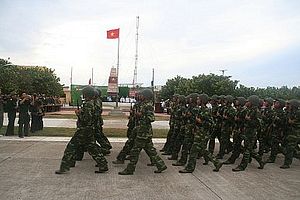Last week, Vietnam’s legislature passed an amendment that reinforces the need to continue to reduce the role of the military in business in the country. Though the move does represent the latest in a series of steps taken by the country to address a longtime challenge, it also obscures the difficult political and economic realities that remain on this front.
Not unlike several other Southeast Asian states – from Myanmar all the way down to Indonesia – the military’s role in business in Vietnam remains a significant and often underappreciated challenge. Focus on the subject tends to wax and wane, with discrete developments, such as disputes over particular tracts of land or individual pieces of legislation, driving occasional interest rather than a fuller understanding of this as a systemic and pervasive challenge.
And while the issue tends to be framed as one of just civil-military relations or transparency, the challenges of actually getting the military out of business in Vietnam also ought not to be understated. The fact is that the degree of the military’s involvement in economic affairs and its autonomy therein are tied to elements of regime preservation in a communist, one-party state – including the balance of power between the Vietnamese Communist Party (VCP) and the Vietnamese People’s Army (VPA) in the control of the Vietnamese polity; off-the-book sources of income for powerful interest groups within the military and the country’s defense budget; and, from some Vietnamese officials’ perspective, the benefits that come from such “dual purpose” entities in a centralized state.
Despite those challenges, the Vietnamese government has said that gradual inroads have been made in that process and that this continues to be a priority that will be advanced. The most recent public estimate offered by Vietnamese defense officials last July indicated that businesses owned by the VPA had declined from 305 in 2000 to 88 in 2016.
Though that aggregate decrease appears impressive, it also placed the focus on the easier metric of how many firms had been shuttered, rather than how the government is determining which firms stay or are eliminated, and what exactly is happening to shuttered businesses and their personnel. In reality, that numerical reduction has been driven by various compromises that have been worked out, including on the distinction between “dual purpose” firms that benefit the state and those that are more purely commercial in nature in order to insulate some actors, as well as restructuring underway within these businesses themselves.
To really get at that how question, more metrics and details would need to be disclosed that would shed light on dimensions such as concentration and connectivity. These details are more sensitive in nature – including rough percentage breakdowns of firm involvement, links between various companies, and how distinctions between “dual use” and “single use” are being determined – and have unsurprisingly not been made public.
As part of ongoing efforts to tackle this challenge, earlier this month, Vietnam’s National Assembly approved an amendment to a law that further reinforces the need to reduce the number of military-owned businesses. According to Vietnamese state media, Vo Trong Viet, the head of the National Assembly’s National Defense and Security Commission, said that the hope is that once the process is completed, “there will be no business units that are entirely economic-driven under the defense ministry.” The new amendment is expected to come into effect on January 1, 2019.
But as close observers of Vietnam know, getting there is easier said than done. The fact that this ongoing project has taken so long to really get off the ground is testament to the general political and economic challenges that confront the country in truly mounting such an effort. Furthermore, Vietnamese officials are fully aware – and some have stated publicly as well in the past – that this will have to be a more incremental process, which includes continuing to reduce the aggregate number but keeping in place major firms that can be insulated on “national security grounds,” especially those so-called “dual use” firms that contribute to developing weapons and technology, as opposed to those that are more wholly commercial in nature, operating in areas such as real estate.
All this is not to dismiss the work that continues to be done in this area in Vietnam, or the value of pursuing it as a general premise. But it is to temper expectations as to how that work will play out given the stubborn realities and enduring challenges that the country has faced on this front, and will likely continue to in the future.































